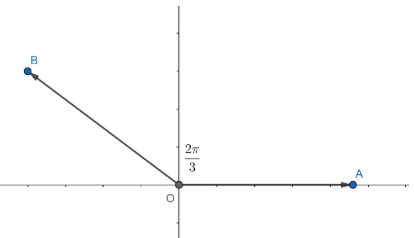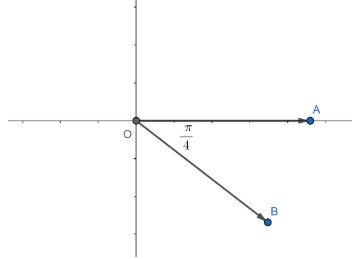Question
Question: Mark the position of the revolving line when it has traced out the following angles A. \(\dfrac{4}...
Mark the position of the revolving line when it has traced out the following angles
A. 34 right angle
B. 321 right angle
Solution
Hint:In order to solve this question, we have to convert the angles into degrees if they are not given in degrees. After that we will try to write the given angle in radian and then in the form of nπ+θ, and we will be able to trace the line.
Complete step-by-step answer:
In this question, we have been asked to trace the position of the revolving line of some angles. For that, we will first convert the angles into radians from degrees and then express it in the form of nπ+θ, where n is a natural number. So, let us consider each part of the question separately.
For part (a) 34 right angle
Right angle = 2π in radian.
Hence, we get 34 right angle as,
34×2π=32π
Now, we will express 32π in terms of nπ+θ. So, we will write the same as,
32π=π−3π
Now, for tracing the revolving line of the angle, we have to have a 2D graph, which has the left and right axis as negative and positive x axis, whereas the axis perpendicular to them is positive and negative y axis. As the angle is π−3π and we know that 1 revolution is completed at 2π, it means that the line will complete half revolution and then we have to subtract 60 degree, so it will be in second quadrant.
Hence, we can represent it as line OB in the figure given below.

The ∠BOA=32π. The line OA has been rotated 32π angle to form OB.
For part (b) 321 right angle
Right angle = 2π in radian.
Hence, we get 321 right angle as,
321×2π=27×2π=47π
Now, we will express 47π in terms of nπ+θ. So, we will write the same as,
47π=2π−4π
Now, for tracing the revolving line of the angle, we have to have a 2D graph, which has the left and right axis as negative and positive x axis, whereas the axis perpendicular to them is positive and negative y axis. As the angle is 2π−4π and we know that 1 revolution is completed at 2π, it means that the line will complete 1 revolution and then we have to subtract 4π, so it will be in 4th quadrant.
Hence, we can represent it as line OB in the figure given below.

The∠BOA=4π. The line OA has been rotated 47π angle in anticlockwise direction to form OB.
Note: Here, we have expressed angles in the form of nπ+θ, because in the coordinate axis we have four quadrants and after an angle of 360∘, we again reach the first quadrant and then the angles start repeating. This makes it easier to understand and represent the angles in the correct quadrants. And we have considered the rotation in an anticlockwise direction.
